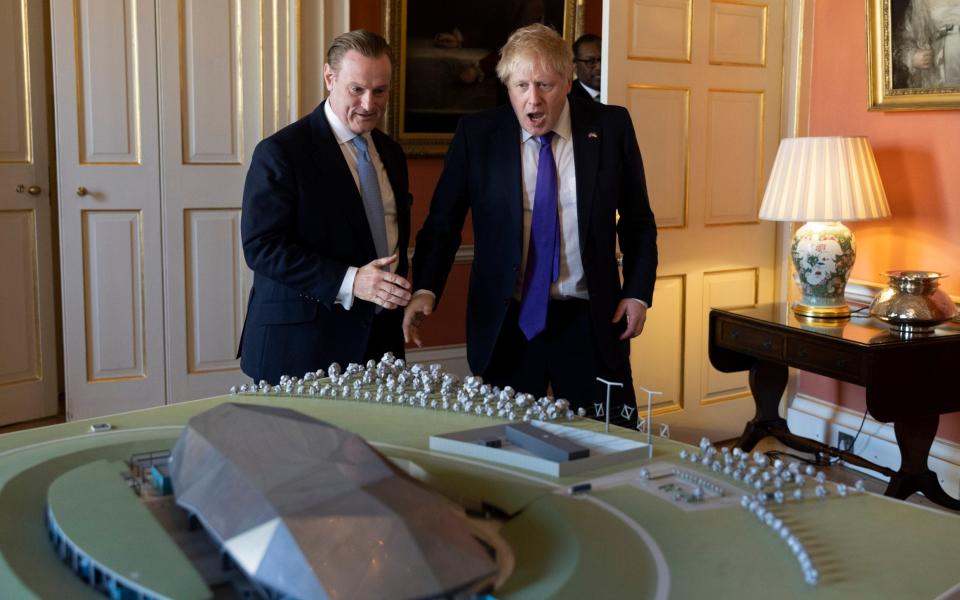Rolls-Royce mini-nukes project at risk

The UK is preparing to invite international bids for next generation nuclear power projects, in a move that could imperil Rolls-Royce’s plans to roll out mini-nuke factories across the country.
Insiders fear efforts to run a competitive tender mean Rolls-Royce could lose out on a government contract, despite the fact that £210m of taxpayer money has already been invested into the company’s efforts to stand-up small modular reactors.
The engineering giant is advancing plans to churn out cheaper, mass-produced, standardised nuclear reactors that would generate carbon-free electricity. The project won the backing of Boris Johnson but his successor in Downing Street, Rishi Sunak, has been more reluctant to back the plans.
It is now understood that the Government is preparing to host a beauty parade of next generation nuclear proposals from around the world that could ultimately see contracts handed to other companies.
Rolls-Royce insiders fear the process could derail its SMR efforts. Executives are concerned that losing the UK Government as a customer could threaten foreign orders, since many could interpret the move as a lack of confidence in the programme.
Rolls-Royce SMR has already frozen hiring as it waits for a contract, The Telegraph revealed last month.
Days before the freeze, new Rolls-Royce chief executive Tufan Erginbilgic warned that the UK was risking its head start on this technology by dragging its feet.
He said: “We need to come to the table and work very seriously and sign an agreement for the deployment of the first project. First mover advantage will be important.”
As talks with Westminster drag on, Rolls-Royce has been holding discussions with the Czech Republic about a deal.
Mr Erginbilgic has said: “If you asked me, will they [Czech Republic] do anything without the UK moving forward first? I don't think so.”
Rolls-Royce's SMR project won the backing of Boris Johnson’s government in November 2021. Mr Johnson, a vocal supporter of nuclear technology as a way to decarbonise the UK’s grid, outlined ambitious plans to build a nuclear plant per year and provided state backing for Rolls-Royce.

However, Rishi Sunak has been less enthusiastic. Mr Johnson wrote to him last month, joining 56 other MPs in demanding faster progress on new plants.
Rolls-Royce SMR is controlled by the jet engine maker but has also attracted investment from the French billionaire Perrodo family, who made their fortune from private oil company Perenco. Qatar's sovereign wealth fund and US nuclear business Exelon Generation are both also investors.
Of the £210m committed by taxpayers, almost half has already been handed to the engineer, it is understood.
SMRs will cost about £1.8bn apiece and Mr Erginbilgic has said the project needs Government backing for customers to have confidence to place advanced orders for the reactors.
Rolls-Royce is among dozens of companies around the world with designs for small, factory-produced reactors. The theory behind mass-producing them is that development costs can be spread over many units to lower costs.
They are also cheap enough for private companies to buy them, with the smallest versions being touted as a prospect for powering container ships.
But other companies are stealing a march on British designs. In January, GE Hitachi signed a deal to build the first small modular reactor in North America, agreeing a deal with authorities in Ontario, Canada.
Rolls-Royce is not alone in being frustrated over the pace of the Government’s decision-making on SMRs and their higher-tech cousins advanced modular reactors (AMRs), which are a few years further away in deployment.
Some developers have abandoned hopes of taxpayer funding, but without guidance from the regulator about how far off design approvals may be, and a site to show that their technology works, lenders are skittish about committing to big projects.
Without these assurances, orders and jobs are on the line. However, the industry is hesitant to attack ministers openly given the requirement to win Government funding.
Tom Samson, chief executive Rolls-Royce SMR, said: “We have over 600 members of staff in the UK, dedicated to bringing our technology to market at pace – a British solution to a global energy crisis.
“Rolls-Royce SMR has called for rapid progress from the Government and we welcome the adoption of that principle in this process.
“We look forward to working collaboratively with Government and Great British Nuclear to realise their ambitions as quickly as possible.”
A government spokesman said: “Small modular reactors could play a vital role in our nuclear programme as we work to increase our energy independence and security, reducing our reliance on fossil fuels and exposure to volatile global gas prices.
“The Government is investing in these new technologies through the £385m Advanced Nuclear Fund including £210m towards the Rolls-Royce SMR programme. We will announce plans for the set-up of Great British Nuclear soon, and we are committed to backing it with appropriate funding to support projects and investment.”

 Yahoo Finance
Yahoo Finance 